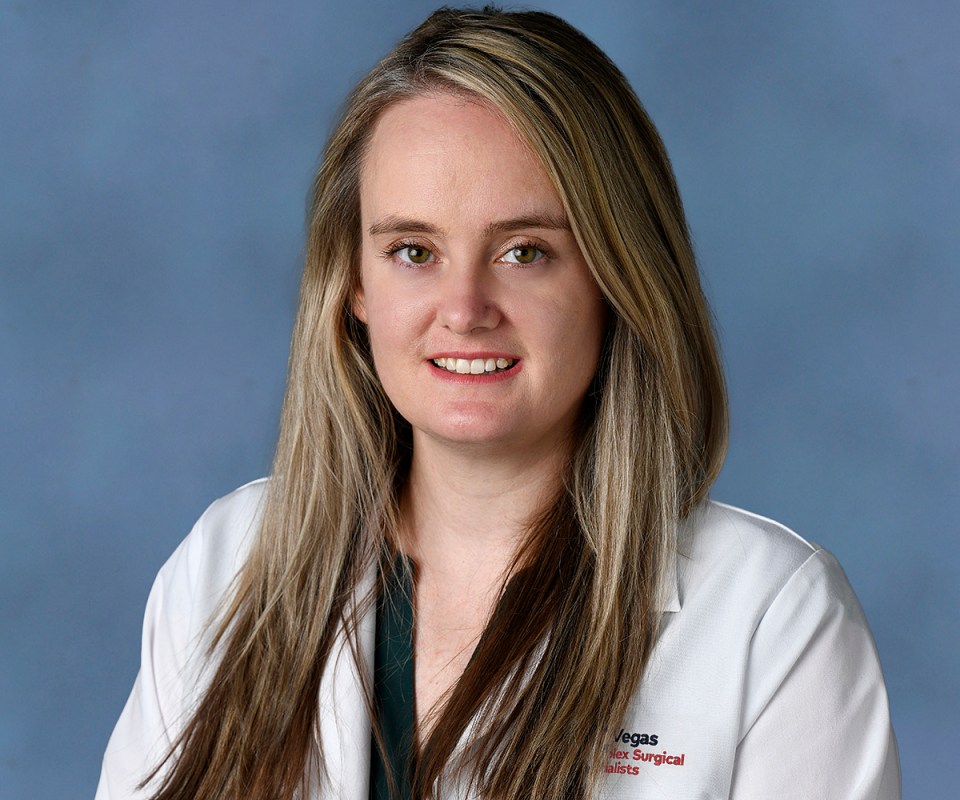
Colorectal cancer remains a significant health concern nationwide, with incidence rates rising, particularly among younger adults.
This trend underscores the urgent need for greater awareness and timely screenings. Dr. Katherine Specht, a colorectal and rectal surgeon at Las Vegas Complex Surgical Specialists, is working to educate the community about colorectal cancer, the importance of screening, and the latest advancements in treatment.
During March, which is Colorectal Cancer Awareness month, Dr. Specht is emphasizing early detection as a critical factor in improving patient outcomes. With proper screening, colorectal cancer is highly preventable and treatable, yet many people delay their screenings due to misconceptions or fear. Dr. Specht is committed to breaking down these barriers by providing accurate information and expert insights.
Dr. Specht joined Las Vegas Complex Surgical Associates, based at MountainView Hospital, in late 2024. Dr. Specht moved to Las Vegas in 2017 after matching in the general surgery program at the Sunrise Health Graduate Medical Education Consortium, based at MountainView Hospital.
After completing her residency, she pursued advanced training out of state in colorectal surgery to hone her skills in treating benign and malignant conditions affecting the colon, rectum and anus, with an emphasis on minimally invasive platforms. She chose to come back to Las Vegas knowing that there is an ever-increasing demand for skilled healthcare providers to meet the needs of our growing community.
We sat down with Dr. Specht to discuss colon cancer, its risks, prevention strategies and treatment options.
Q: Colorectal cancer is often called a “silent killer” because early stages may not have symptoms. What are the biggest misconceptions people have about this disease?
A: Most early colorectal cancer will have no symptoms. And early screenings can detect it early before it becomes symptomatic and more advanced. There are several misconceptions when it comes to colon cancer, including:
- Someone can be “too young” for colon cancer. Patients are developing colorectal cancer at younger ages, and because of this, screening is now recommended to begin at age 45.
- If someone doesn’t have family history of colorectal cancer, they don’t need to get a colonoscopy. The statistics show that 85 percent of patients diagnosed with colorectal cancer do not have family history of colorectal cancer.
- I often also hear, “I have only a little bleeding.” Bleeding is never normal. It could be a sign of something such as hemorrhoids or something more serious as cancer. It is important you speak with your physician.
Q: The recommended screening age was recently lowered to 45 due to rising cases in younger adults. What do we know about why this trend is happening, and why is screening so critical?
A: We’re seeing an increase in colorectal cancer diagnoses in adults under 50, but the exact cause isn’t fully understood. Factors like, diet, lifestyle, gut microbiome changes and environmental exposures may play a rule.
Because of this rise, the American Cancer Society now recommends colorectal cancer screenings begin at age 45 for people at average risk. Those with a family history of colorectal cancer or additional risk factors may need to start even earlier.
Screening is critical because colorectal cancer is highly preventable—when we find and remove polyps early, we can stop them from becoming cancerous.
Q: Many people delay or avoid a colonoscopy due to discomfort or anxiety. What do you say to those who are hesitant to schedule the procedure?
A; It is understandable to be nervous, but I always reassure patients that a colonoscopy is a quick and safe procedure that could save their life.
The actual exam takes about 30 minutes, and patients are under sedation, meaning they feel little to no discomfort. The most common complaint is the bowel prep the day before, but it’s a small inconvenience compared to the benefit of early detection.
A colonoscopy is the gold standard for detecting and removing precancerous polyps before they turn into cancer. If caught early, colorectal cancer is highly treatable, with survival rates over 90 percent.
Q: If caught early, colorectal cancer is highly treatable. Can you explain how screening works and why early detection is so important?
A: Screening can prevent cancer from ever developing by detecting and removing precancerous polyps before they become cancerous.
Colonoscopy is the most effective method, but there are also stool-based tests that can help detect abnormalities. If any issues are found in a non-invasive test, a colonoscopy is recommended for further evaluation.
Early detection makes treatment less invasive and more effective.
Q: As a colorectal surgeon, you often treat patients with advanced cancer. What would you like people to know about treatment options and outcomes?
A: As a colorectal surgeon, I often see patients whose cancers could have been prevented or treated at a much earlier stage if they had been screened on time. The consequences of delayed screenings include more advanced cancers with diagnoses that can require more extensive treatments, or may not be curable. We can encourage people to act sooner by spreading awareness about screening, discussing the options of screening and addressing the questions and fears people have about the procedure. Additionally, it is important that everyone knows their family history for all medical conditions but those with a family history of colon cancer need to discuss it with their family members and encourage early screening.
Colorectal cancer is one of the most preventable cancers with proper screening and awareness. Don’t wait—schedule your screening today!
To learn more about Dr. Katherine Specht and Las Vegas Complex Surgical Specialists, visit: www.complexsurgicalspecialists.com or call 702-962-2300.


